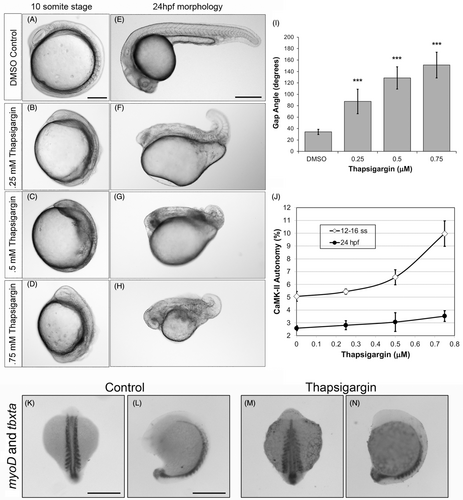Fig. 7 Persistent Ca2+ elevations during gastrulation activate CaMKII and cause cell migration defects. Zebrafish embryos were treated with thapsigargin (TG) between 5 and 7hpf, washed free of TG and then harvested or imaged later. (A–H) Images of 10ss and 24hpf embryos after transient treatment with the indicated concentration of TG-treated embryos. Scale bar 0.25 mm (A) and 0.5 mm (E). (I) Body gap angles of control dimethyl sulfoxide and TG-treated embryos were measured at the 10 ± 1 somite stage (ss) and averaged from 17 to 54 embryos, ***p < .001. (J) CaMKII-specific activity was measured in whole embryo lysates of 12–16ss and 24hpf embryos after transient TG treatment using the autocamtide-2 peptide–based assay. CaMKII autonomy represents the percentage of whole embryonic CaMKII that is activated and thus Ca2+/CaM-independent. (K–N) Dorsal and lateral views of representative 15ss embryos either untreated or transiently treated with TG as described above and then probed for myoD and tbxta. Anterior is at top. Scale bar 0.5 mm.
Image
Figure Caption
Acknowledgments
This image is the copyrighted work of the attributed author or publisher, and
ZFIN has permission only to display this image to its users.
Additional permissions should be obtained from the applicable author or publisher of the image.
Full text @ Dev. Dyn.

